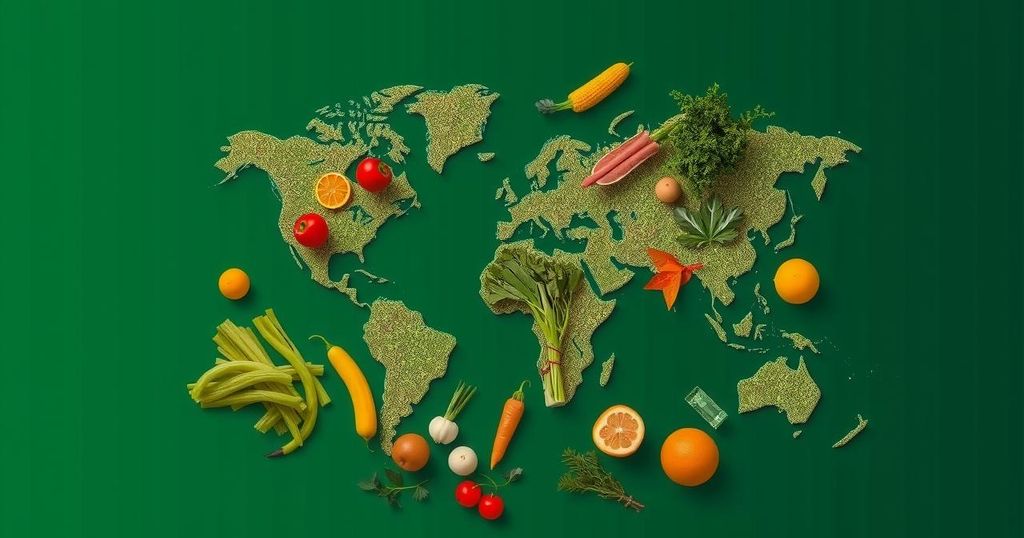TAPP Coalition Advocates for Global Meat Tax at COP29

The TAPP Coalition urged nations at COP29 to implement a global meat tax to combat climate change, suggesting that this tax, alongside vegetable subsidies, could reduce greenhouse gas emissions. They criticized countries like the U.S. and UK for lagging in making dietary shifts, while praising Switzerland and Denmark for their initiatives. The discussions take place in Baku, Azerbaijan, amidst a backdrop of controversial political representation and a lack of attendance from President Biden.
The TAPP Coalition, a proponent of sustainable food policies, has called for the implementation of a global meat tax during the 2024 U.N. Climate Change Conference (COP29) in Baku, Azerbaijan. Advocating for this initiative, TAPP asserts that taxing meat and subsidizing vegetables can mitigate the effects of excessive animal protein consumption and significantly reduce greenhouse gas emissions within the agricultural sector. TAPP policy officer Willem Branten emphasized the importance of incorporating these dietary changes into the conference’s final commitments, particularly urging influential entities such as the EU Commission and China to spearhead this movement. The coalition did not shy away from criticizing countries including the United States, Australia, Canada, and the United Kingdom, labeling them as “laggards” in adopting effective food pricing strategies aimed at combating climate change. In contrast, TAPP commended Switzerland, Denmark, and the EU Commission for their progressive policies regarding food pricing. This year’s COP29 has garnered considerable attention not only for its climate-centric discussions but also due to its inclusion of representatives from controversial regimes, such as Afghanistan under Taliban control. Notably, President Joe Biden opted not to attend the conference, delegating senior officials to represent the United States in crucial discussions regarding energy and climate policies. The push for a meat tax aligns with a recent U.N. Food and Agriculture Organization (FAO) report that examined the advantages and disadvantages of taxing various food items, particularly meat. In his remarks at COP29, Branten stated, “We believe that COP29 and UNFCCC conferences thereafter can only be successful if the closing statement includes transitioning away from animal protein overconsumption according to national or global dietary guidelines by implementing greenhouse gas emission pricing mechanisms in agri-food systems.” TAPP’s advocacy also included calls for enhanced subsidies for vegetables and an assessment of food pricing policies among U.N. member states, wherein they reiterated concerns regarding the slower progress of the U.S. and some western nations compared to their European counterparts. The conference thus serves as a platform for significant dialogue on sustainable dietary choices as a strategy for climate action. Moreover, the discussions take place amidst criticism directed at the host nation, Azerbaijan, for its reported human rights violations and humanitarian law infractions.
The idea of taxing meat has gained traction as a potential measure to address climate change through dietary shifts. Livestock farming is a significant contributor to greenhouse gas emissions, and organizations such as the TAPP Coalition advocate for changing consumption patterns to reduce environmental impact. The U.N. Climate Change Conference serves as a vital venue for discussing such critical policies, and international cooperation is essential to implement effective strategies against climate change. Previous conferences have led to commitments on various sustainability issues, making COP29 an important juncture for advancing dietary reforms.
In summary, the call for a global meat tax reflects growing recognition of the need to address climate change through dietary adjustments. The TAPP Coalition’s advocacy at COP29 highlights the disparities between countries in their commitment to sustainable food policies. Greater leadership from influential nations, alongside robust subsidies for plant-based foods, could catalyze significant progress in reducing greenhouse gas emissions from the agricultural sector. As discussions continue at COP29, the emphasis on harmonizing food pricing policies remains crucial for future climate negotiations.
Original Source: www.shorenewsnetwork.com






